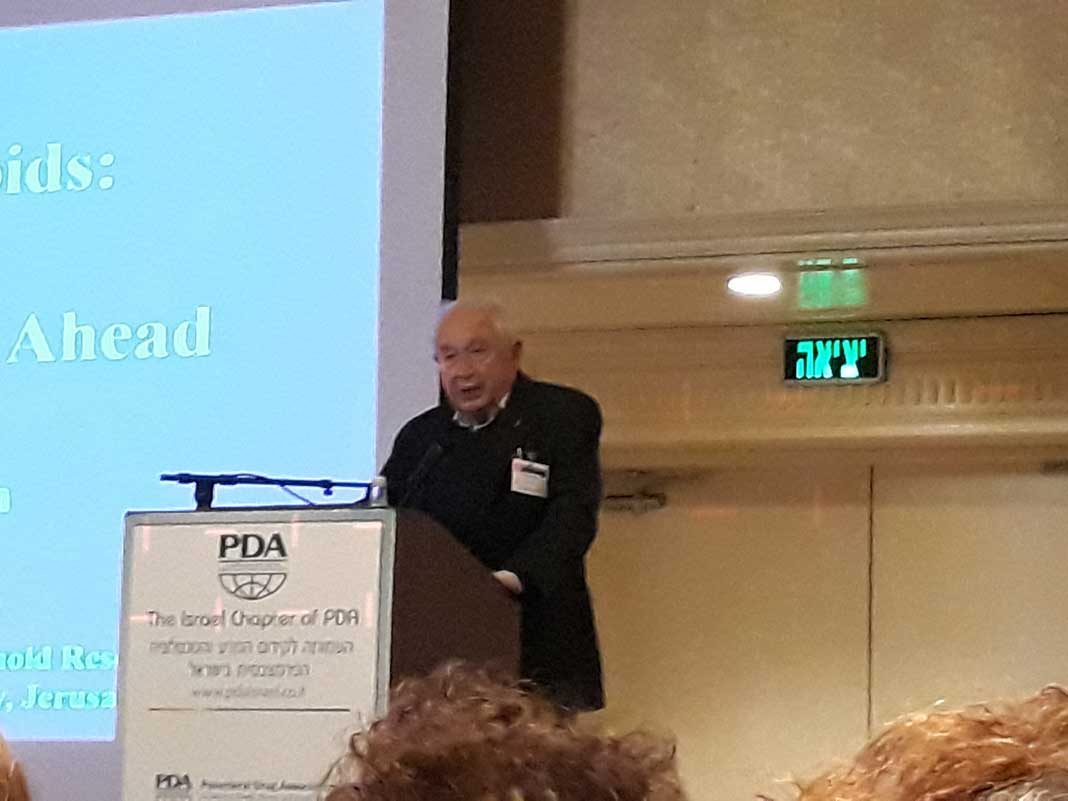Having turned 91 back in November, I felt it was about time I wrote about the brilliant genius Raphael Mechoulam, commonly nicknamed the ‘father of cannabis’.
Who Is Raphael Mechoulam?
Raphael is an Israeli organic chemist, born in Bulgaria before emigrating to Israel in 1949. He studied biochemistry at the Hebrew University of Jerusalem, obtaining an MSc in 1952.
Raphael was introduced to science from an early age, his dad being a physician at a local hospital who was a key inspiration for him. One sad point of note, his dad was sent to a concentration camp, but fortunately survived.
Raphael continued his education with a PhD in chemistry, before continuing his postdoctoral studies in New York.
However, he eventually returned to the Hebrew University of Jerusalem in 1965 in a work capacity, going on to be an associate professor and then the professor of medicinal chemistry
Why Is Raphael Mechoulam Known As The Father Of Cannabis?
Back in the 60’s, Raphael started scientific experiments around cannabis, where they managed to isolate tetrahydrocannabinol (9-THC). They also managed to isolate a number of other cannabinoids, such as CBD, CBG and CBC.
As he studied more into the chemistry of natural products, he was astounded to find that morphine had been successfully isolated from opium, while cocaine had been isolated 100 years prior, highlighting the mysterious world of chemistry around these plants and substances, which grew his interest in exploring more around cannabis.
He wrote a detailed paper on the structure of cannabidiol in the 60’s, which many future studies based their research on.
He also found through his preclinical work on rats that there were antiepileptic properties associated with CBD, the same with THC, highlighting the significant importance of this plant and how it could be used for medical usage.
Through the 80’s, Raphael’s studies and a number of other research groups were starting to find that THC’s mechanisms of action might not be ‘non specific’, as they could display stereoselectivity.
This brought forward a desire to find cannabinoid receptions in mammalian tissues, leading to the discovery of cannabinoid receptors, as well as what could activate these receptors.
Raphael’s team led the way and managed to discover the endocannabinoid system, another huge success point and probably his biggest ‘win’ through his career, completely changing the way we look at the central nervous system.
The findings of anandamide and 2-AG were ground-breaking and were really the antagonist for the current CBD industry we see today.
He’s even been credited with discovering the ‘entourage effect’ with cannabis, that the cannabinoids work better together than the sum of their parts, predominantly when they potentiate the activity of THC.
Is Raphael Mechoulam Still Working?
Quite remarkably, it seems so! He has produced 488 publications, he won the NIDA discovery award, EMIT prize in exact sciences and the Harvey prize of the Technion, but he’s still motivated and curious as ever.
Raphael gave a speech at the CannaTech conference in 2020 (so jealous of those that attended), where he introduced his latest discovery, being cannabidiolic acid methyl ester (EPM301), a secondary substance appearing later in the plant.
Previously, the cannabidiolic acids were considered unstable and were therefore not utilised in pharmaceutical drug development, but this was a massive step forwards in the evolution of CBD usage and cannabinoid based medicines.
The early signs are that this new discovery is much more potent than CBD or THC, but without the ‘negative side effects’.
Epilepsy Frustration
Raphael Mechoulam published a paper in the 80’s that cannabis worked as a treatment for epilepsy in animals. They then did some studies on humans, where they found positive effects when dealing with epilepsy and preventing seizures.
Following their human studies, with incredible results, Raphael was expecting a huge number of larger trials to take place, before becoming an established drug.
But, as we all know, virtually nothing happened for 30 years, with people suffering from epilepsy having to accept that there wasn’t a legal option available to them.
In fact, the biggest change was when parents were providing medicinal cannabis illegally for their epileptic children, such as the case with Charlotte’s Web.
This became huge in the media and other parents of epileptic children started doing the same, however the costs were through the roof, costing thousands every month, making it unaffordable without running donation campaigns.
An increasing amount of pressure was placed on the governments in the USA and the UK to change the laws, while the US authorities signed off on studies taking place and the eventual introduction of Epidiolex.
It remains one of Raphael’s biggest frustrations was that this took 30 years to take place, that the research into autoimmune diseases was largely ignored until parents took it upon themselves to make the changes the government weren’t interested in implementing.
Many claim the lack of action was based on pressure and lobbying from pharmaceutical companies, I won’t go into that subject, but I completely understand and agree.
Another frustration is that anandamide, which he’s provided evidence that it has medicinal properties, still hasn’t been used in drugs. He points to the fact that insulin a hundred years ago was then turned into a drug within 9 months, so it’s illogical that anandamide is being ignored in the same manner, due to legal reasons and patent problems.
Life Time Award
If there was ever a life time achievement award at the World CBD Awards, Raphael would be the most deserved winner of them all.
It might mean nothing, but from a personal level, Raphael Mechoulam wins my personal Life Time Achievement Award for his contributions towards the science and studies of medicinal cannabis.
Countless lives may have been saved through his research and the implications of future studies is still to be fully understood, but his ground breaking findings have changed lives and built this industry I now find myself in.

